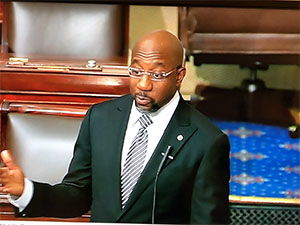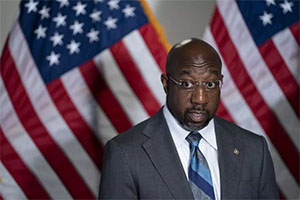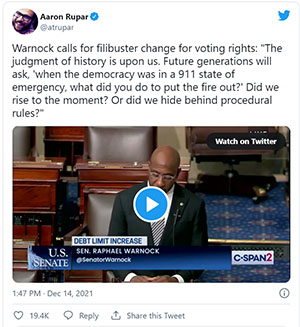Senator Warnock Calls for Senate Rules Change to Pass Voting Rights Legislationby Senator Raphael Warnock
December 14, 2021
NOTICE: THIS WORK MAY BE PROTECTED BY COPYRIGHTYOU ARE REQUIRED TO READ
THE COPYRIGHT NOTICE AT THIS LINK BEFORE YOU READ THE FOLLOWING WORK, THAT IS AVAILABLE SOLELY FOR PRIVATE STUDY, SCHOLARSHIP OR RESEARCH PURSUANT TO 17 U.S.C. SECTION 107 AND 108. IN THE EVENT THAT THE LIBRARY DETERMINES THAT UNLAWFUL COPYING OF THIS WORK HAS OCCURRED, THE LIBRARY HAS THE RIGHT TO BLOCK THE I.P. ADDRESS AT WHICH THE UNLAWFUL COPYING APPEARED TO HAVE OCCURRED. THANK YOU FOR RESPECTING THE RIGHTS OF COPYRIGHT OWNERS.
 Senator Warnock Address to the Senate
Senator Warnock Address to the SenateWrestling with my conscience. Before we left Washington last week, we in this chamber made a change in the senate’s rules in order to push forward something that all of us think is important. We set the stage to raise the nation’s debt ceiling, and yet as we cast that vote to begin addressing the debt ceiling, this same chamber is allowing the ceiling of our democracy to crash in around us.
The American people have been pushing for leaders in Washington to address voting rights. Everywhere I turn I have been hearing from my constituents in Georgia. They are deeply worried. I heard it all weekend. I’ve been hearing it over the last several months. And I submit that they are worried for good reason. They know their history. They are witnessing what is happening to our democracy in real time. And they see the handwriting on the wall. They see the sweeping voter suppression proposals in 49 states, and the dozens of new laws that have now popped up across the nation, fueled by the big lie that seeks to delegitimize the voices of millions of Georgians and Americans who made their voices heard, made history, and more importantly made a difference last November and last January.
The American people see what is happening in Arizona and in Texas and in Florida and in Wisconsin and in Iowa. And they see what’s happening in Georgia, my home state, where a new law S.B. 202 passed right after I won, will make it harder for some voters to access their ballots by making it more difficult to vote by mail, allowing far fewer drop boxes and only allowing for the use of those boxes, listen, during business hours. You can use the drop boxes during business hours, which sort of defeats the purpose of having a drop box. In fact, back home, the second most senior republican in the Georgia state senate announced recently that he wants to do away with election drop boxes all together, literal boxes where registered, eligible voters simply can drop off their ballots. On their way to the night shift, or on their way back home. It seems to me that they want fewer voters and more dark money in our elections. And that’s the sad place we’re in, madam president, right now.
But what is even more disconcerting is that these politicians in the state legislature have already laid the tracks to take over local boards of elections. For almost any frivolous reason. to undermine the voices of local voters and local election administrators, control the count, muddy the waters, question or determine the outcome. And in the face of this crisis, the question is this, has this chamber risen to the occasion to take on the issue of voting rights, which I submit is the central moral issue confronting this congress in this moment. What have we done?
To strengthen access to the ballot, as bedrock voting rights protections have been shredded by our courts, or to protect the sacred right to vote as partisan state legislatures have passed laws to dilute that right for so many people? Well, some of us have acted. Democrats in this body have tried, not once, not twice, but we’ve tried this congress on three occasions to consider legislation to protect and expand voting rights so that more eligible Americans can make their voices heard and help shape the direction of our country, and each time, whether it was for the for the people act or the John Lewis voting rights advancement act or the freedom to vote act, with just one lone exception, all of our friends across the aisle have refused to engage with us in any way to address the growing barriers to what is basic to American democracy, the ballot box. And here’s what we’ve said, we’ve said to our republican friends, if you don’t like this provision or that provision, let’s talk about it. Offer some amendments. Come, let us reason together. Let us have a debate out in the open so that the American people can hear it.
Everybody talks about the divisions in America right now. Here is what folks on the left and the right agree on, there is something awry in our democracy, and in this moment in which there is debate happening on the outside, how is it that we refuse to even have a debate in the senate? They don’t even want to have a debate. And so, here we are, months have passed, no, that’s not true, years have passed. Democrats have tried again and again to engage our Republican friends in a discussion on this issue, one that lies at the foundation of our democracy, and time and time again, because of a lack of good-faith engagement, the rules of the senate have prevented us from moving that conversation forward.
We could not imagine — we could not imagine changing the rules. That is, until last week. Because last week we did exactly that. Be very clear, last week we changed the rules of the senate. To address another important issue, the economy. This is a step, a change in the senate rules we haven’t been willing to take to save our broken democracy, but one that a bipartisan majority of this chamber thought was necessary in order to keep our economy strong. We changed the rules to protect the full faith and credit of the United States government. We’ve decided we must do it for the economy, but not for the democracy. So, Madam President, I will be honest, this has been a difficult week for me as I’ve pondered how am I going to vote on this debt ceiling question we’re about to take. I feel like I’m being asked to take a road that is a point of moral dissonance for me. Because while I deeply believe that both our democracy and our economy are important,
I believe that it is misplaced to change the senate rules only for the benefit of the economy when the warning lights on our democracy are flashing at the same time.
I happen to believe that our democracy is at least as important as the economy. Ours is a great nation, built upon both free enterprise and the free exercise of basic democratic rights. You cannot have good capitalism without freedom. Each is strengthened by the other. And together, they make for a nation that is both prosperous and free, a nation where everybody can breathe and every child has a chance to live up to her highest potential. And so I stand here because of my children. My two precious children. And I think every day about what kind of country I want them to grow up in. I stand here today because we’re in a place, We’re dealing with the consequence of misaligned values. And misplaced priorities. And that is for me a serious problem, because I lead Ebenezer Baptist Church where John Lewis wore shipped, and where Dr. King preached, and I ask myself all weekend as I wrestled with how I would vote, I asked myself what would Dr. King do. And I thought this week about Dr. King’s speech in front of the Lincoln memorial. No, not the 1963 “I have a dream” speech. But the one he gave the first time he spoke in front of the Lincoln memorial in 1957, where he addressed what he called, “all types of conniving methods that were getting in the way of the free exercise of the constitutional right to vote,” his rallying cry that day, in 1957, was give us the ballot.
So, Madam President, in light of the conniving methods of voter suppression we have seen enacted into law since the January 6 attack on the capitol, I come to the floor today to share with the people of Georgia and the American people the message that I shared with my colleagues over the weekend and earlier today during our caucus meeting. I said to my Democratic colleagues over the last several days, number one, unfortunately, the vast majority of our Republican friends have made it clear that they have no intention of trying to work with us to address voter suppression or to protect voting rights. They have embodied by their actions the sentiments of conservative strategist Paul Wyrick, who dared say in 1981, “I don’t want everybody to vote.” That’s what he said. Elections are not won by a majority of people. They never have been from the beginning of our country, and they are not now. As a matter of fact, he went on to say, our leverage in the elections, quite candidly, goes up as the voting populus goes down. Second thing he said to my Democratic colleagues today is that while we cannot let our Republican friends off the hook for not being equitable governing partners, if we’re serious about protecting the right to vote that’s under assault right now, here’s the truth, it will fall to Democrats to do it.
If Democrats alone must raise the debt ceiling, then democrats alone must raise and repair the ceiling of our democracy. How do we in good conscience justify doing one and not the other? Some of my democratic colleagues are saying well, what about bipartisanship? Isn’t that important? i say of course it is. But here’s the thing we must remember, slavery was bipartisan, Jim Crow segregation was bipartisan, the refusal of women suffrage was bipartisan, the denial of the basic dignity of members of the LGBTQ community has long been bipartisan. The three-fifth compromise was at the expense of black people’s basic humanity.
When colleagues in this chamber talk to me about bipartisanship, which I believe in I just have to ask, at whose expense? Who is being asked to foot the bill for this bipartisanship? And is liberty itself the cost? I submit that that’s a price too high and a bridge too far. And so I struggled this weekend. I talked to folk I believe in. Among them, I spoke with Reverend Ambassador Andrew Young who was with Dr. king until the very end about this vote. I talked to Ambassador Young, and I asked him, what do you think? And he said, I try not to worry, but I’m worried about our country. And then this 89-year-old battle-worn soldier in the nonviolent army of the Lord drew silent on the phone. Then he said to me, tell your colleagues that among your constituents are people who literally laid their lives on the line for the basic right to vote. They lost friends. They lost so much. And so this is a real moral quandary for me, and it makes it difficult for me to cast this vote today, but after many conversations, with colleagues, with Georgians, with experts who know the economy, with voting rights advocates and civil rights leaders,
I will indeed vote today with anguish. I will vote to raise the debt ceiling. I’m voting yes because I’m thinking about the kids in the housing project where I grew up in Savannah, Georgia. I’m thinking about the hardworking families pushing to recover from the pressures of this pandemic, those on the margins and those whom are least resilient for whom a collapse of the economy would be catastrophic.
Ironically these people are being suppressed by the voting efforts. I’m thinking of them and the folks of Georgia as I cast my vote today to raise the debt ceiling. But I’m also thinking about what we need to do to keep our democracy and our economy strong today and for the next generation. Once we handle the debt ceiling, the Senate needs to make voting rights the very next issue we take up. We must do voting rights, and we must deal with this issue now. So let me be clear, I’m so proud of what we did with the bipartisan infrastructure bill and the major economic investments we’re putting finishing touches on that will close the Medicaid coverage gap and deliver historic relief to Georgia farmers and expand broadband access and so much more. But, madam president, I have to tell you that the most important thing that we can do in this Congress is to get voting rights done. Voting rights are a preservative of all other rights. They lay the ground for all of the other debates. And so to my democratic colleagues, I say while it is deeply unfortunate, it is more than apparent that it has been left to us to handle alone the task of safeguarding our democracy. Sadly, many of our republican friends have already cast their vote with voter suppression. And so the judgment of history is upon us.
Future generations will ask when the democracy was in a 911 state of emergency, what did you do to put the fire out. Did we rise to the moment or did we hide behind procedural rules? I believe that we Democrats can figure out how to get this done, even if that requires a change in the rules, which we established just last week that we can do when the issue is important enough. Well, the people of Georgia and across the country are saying that voting rights are important enough. I think that voting rights are important enough. And so we cannot delay. We must continue to urge the party of Lincoln not to give in to the very forces of voter suppression that Dr. King described in that 1957 speech while standing in the shadow of Lincoln. But even as we do that, we cannot wait. Dr. King’s words summoned us to this very moment. He said the hour is late. The clock of destiny is ticking out, and we must act now before it is too late.



